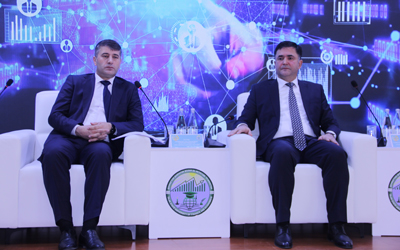News

Advantages of the development of the financial sector during the transition to the digital economy
Under this title, on December 7 it was held an International scientific-practical conference at the Tajik State University of Finance and Economics, dedicated to the Day of the employees of the financial authorities of the Republic of Tajikistan.
Rector of TSUFE Hakimbek Abdualimzoda congratulated those present at the congregation on the professional holiday and expressed that since 2011, on the basis of the Decision of the Supreme Assembly of the Republic of Tajikistan, December 7 has been celebrated as the Day of Finance Authority employees as well as an annual summary of the achievements of financiers and financial institutions. Every year TSUFE holds an International, republican scientific-practical conference or round tables dedicated to the professional holiday of financiers, where are presented the scientific and educational achievements of professors and teachers of the university.
He noted that in the years of State Independence, with the initiative of the President of the Republic of Tajikistan, Honorable Emomali Rahmon there was formed a stable financial management system in the country, which is completely different from the previously operating planned system, and it was built according to the requirements of the market economy. One of the main manifestations of this system is ensuring financial security, issuing national currency, conducting an independent monetary and credit policy, improving the taxation system, ensuring transparency and increasing the efficiency of budget expenditures, maintaining a balanced state of budget financing. In the conditions of the transition to the digital economy, the advantages in the financial system are obvious and they contribute to the progress of the sector.
According to H. Abdualimzoda, the legal framework of the digital economy is being formed in the Republic of Tajikistan, and several state documents, including the Concept of Electronic Government, the State Program for the Development and Implementation of Information and Communication Technologies, and the Concept of the Digital Economy, have been adopted and are in use.
- All professors and teachers of TSUFE welcome their professional holiday with significant achievements in the process of education and scientific-research work and are proud of the fact that they contribute to the development of the country's finances by training highly qualified personnel in this field and solving financial scientific problems.
This year, there can also be observed the significant achievements in the process of improving the quality of training of highly qualified personnel. Only in recent years, lecturers have developed and published dozens of textbooks and teaching aids. There are widely used modern teaching methods and technical tools in the process of education. A large number of our students took part in competitions and Olympiads of the national and international level and took honorable places, - added the rector.
Next, the First Deputy Minister of Finance of the Republic of Tajikistan, Jamshed Karimzoda, spoke, who stated that the digital economy is the digitalization of sectors of the national economy through the widespread use of digital computer technologies, which are used to increase the productivity of production and equipment, and it also contributes to the storage, sale and availability of goods and services. The implementation of the digital economy makes it possible to provide digital government services, develop the sectors of the national economy, budget revenue, transparency, simplify procedures, train qualified specialists in various fields, attract modern technologies, and overall, improve the people's living standard in the country.
Then, the Deputy Rector for science of the Academy of Economy and Civil Service under the President of the Russian Federation, Professor Andrey Margolin made a virtual speech and called the selection and consideration of this subject to be accepted and supported.
Also, the Head of the international relations department of the Shandong Linsheng Educational Technology Company of the People's Republic of China, Yu Yang, made a presentation on the topic “Reforms of the higher education system in post-pandemic conditions: China’s experience in the field of financial education.” It was noted that during the pandemic, there were mastered new methods of learning in the People's Republic of China, that is, based on the experience gained, along with traditional education, it was created the distance education and was developed the digital economy. Thus, in terms of training highly qualified personnel, it has been developed the quality of online education, and, there have been created the prerequisites for improvement in other areas, and China has achieved new successes.
In continuation Professors Rakhmatzoda Rustam, Sharifzoda Bahrom, Husain Isaynov and others made speeches and made useful proposals in the direction of the development of the digital economy in the field of finance.
It was said at the conference that among the states of the modern world, Tajikistan is considered to be one of the countries that is taking its first steps towards the development of the digital economy. That is, in order to expand the national economy and present it at the level of the world economy in the Republic of Tajikistan based on the Message of the President of the Republic of Tajikistan Honorable Emomali Rahmon "On the directions of internal and foreign policy of the Republic of Tajikistan" dated December 26, 2018 it was developed and approved "Concept of the economy digital in the Republic of Tajikistan" by the decision of the Government of the Republic of Tajikistan on December 30, 2019.
In the end there was continued the discussion in the conference and it continued its work in sections.
Navruz Jobirov









